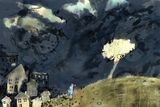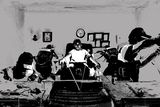New Irish Writing: Growth by Margaret Cahill
New Irish Writing's winning story for February 2024


Helen peers out her bedroom window at the silhouette of an old oak tree in the field behind her house. She’s only noticed it recently. It must have been part of one of the many hedgerows that used to criss-cross the land. Now it’s the last survivor in a desolate wasteland. Gone are the cattle and the foxes, the lapwings and the chaffinches and the old stone sheds at the centre of what would have once been a farm before the ever-expanding suburb ate it up. The diggers and bulldozers that turned the field into a desert of mud have all gone now too, the developer no doubt waiting for the planning permission that will give him the go-ahead to plant yet more houses there.
She didn’t grow up in a housing estate and even after 20 years here, it stills feels like an unnatural place to Helen. There is no sense of community here. Everyone is hidden behind closed doors in row after row of identical boxes linked by tarmac roads that take them to and from their homes without any interaction with the people living around them. It is a scene replicated in the housing estates that fan out in all directions. It reminds her of a JG Ballard story she read years ago, though she can’t remember which one. His foretelling of a strange, dystopian future is now her reality and it is not one she has warmed to.
The shape of the tree reminds her of the diagrams of her lungs the doctors are so fond of showing her. Its thick trunk splits into two main limbs that divide endlessly into ever smaller branches and twigs, just like her bronchi and bronchioles. Branches sounds much more elegant. She likes the idea of having something in common with this strong, majestic oak tree, especially since her own branches are under attack. The name they use for it seems to change all the time. It is a growth, a mass, a tumour, carcinoma, cancer, depending, she suspects, on how determined or defeated she looks sitting across from the doctor on any given day. Helen stays at the window watching the tree as the light fades, its upper branches disappearing against the twilight sky until, eventually, the whole thing melts away into the darkness.
In the morning, she pauses to look at the tree again before going downstairs. She wonders how old it is. Left to its own devices, an oak like that could easily go on living for hundreds of years. She isn’t sure if she has a hundred days left in her. There is something comforting about the solidness of it. She thinks about how she’s never really seen it until now and wonders what else she’s missed around her. Maybe she didn’t need to see it until now. Maybe it’s meant to give her hope.
“Jesus, Helen, you’re really losing the plot now,” she says out loud.
She’s never been one for all that hippy-dippy spiritualism people seem to be so eager to adopt these days. She had to fight off her well-meaning friends who kept wanting to bring her to Tibetan bowl singing and shamanic-healing workshops. She gave meditation a go to humour her sister but all that talk of ‘energy’ and ‘chakras’ had her rolling her eyes. She’s still too cynical for all that, even if she is dying.
The last round of chemo stopped the cancer from growing but didn’t shrink it. It started advancing again with renewed vigour as soon as the treatment finished. Helen thinks their attempts to kill it only angered it. This new drug is her last chance. It’s more potent than the first one they tried and comes with a list of long-term side effects that are serious illnesses in their own right. If the cancer doesn’t kill her, she’ll be living with the consequences of this treatment for the rest of her life.
When her chemo starts back, Helen spends the first few days after each session in bed. On these days, she can’t stand the noise of TV and can’t concentrate enough to read or look at anything on her phone so she spends more and more of her time just lying there, resting. The top of the tree is visible from her bed. She strains to see if there is any sign of buds appearing, even though she knows she’s too far away to see them. She’d like to see it gain its full crown of leaves again but knows she doesn’t deserve it, having been blind to its existence for so many years.
Each week when she lies back in the big reclining chair in the hospital, she closes her eyes and thinks of the tree. As the poison trickles drop by drop into her bloodstream, she visualises the cells of the tree as they slowly transport water from the soil up its trunk and out to the vast network of branches and twigs that make up its skeleton. She envisions the chemo drug spreading through her body in the same way, destroying cancer cells as it travels through her. She tries to welcome it as the tree welcomes water. As it grows and thrives, she imagines her body doing the same.
With each treatment, she grows more and more bone-weary and can barely keep her eyes open as her sister drives her home. When it’s clear that she can’t manage on her own any longer, her sister moves in with her and carts her from bed to toilet and back to bed again, holding spoons of soup and yoghurt and soft mashed potato to her lips when she is too weak to feed herself.
When the final dose has been pushed through her veins, she sleeps almost entirely through the following week, cocooned in darkness in her bedroom. She allows her sister to open the window to release the vapour of death that must be enveloping the room but Helen won’t let her open the curtains or turn on the light. The tiniest sliver of brightness seems to penetrate deep into her brain, causing her searing pain. She wears a dark eye mask for her occasional trips to the bathroom.
Slowly, over the next couple of weeks, Helen recovers to the point where she can sit up and talk for short periods of time again. It is a relief to her to no longer feel like death would be easier than going on living. When her sister pulls open the curtains, she is heartened to see the tree there, standing tall and proud as ever. She’d been too sick and weak to even think about it for weeks.
“Maybe I’ll make it after all, my friend,” she thinks to herself as she notices it is starting to grow leaves again.
When she is able to get out of bed for a few hours in the afternoons, Helen insists that her sister takes a break and goes home. It’s a waiting game now. She has three more weeks until her PET scan and probably another week until she finds out if it has all been worth it or if she has just wasted the precious time she has left torturing her tired, battered body.
On the morning of the scan, she sleeps in until 10, having lain awake for most of the night, only drifting into a fitful sleep sometime after six. She stops at the windows to greet the tree one last time before the final verdict. But there is nothing there, nothing but a huge stack of small branches and debris. She can’t quite believe that the grandeur of the tree has been reduced to little more than bonfire material. A huge bulldozer in the far corner of the field has loaded the main trunk and the larger branches on to the flat-bed trailer of a truck.
“Damn you,” she says, closing her eyes to shut off the sight of destruction. “Damn you to hell.”
Tears fall silently from her eyes, tears for the tree which had been there before her and which she hoped would be there long after, tears for herself, for what she has been through, and the terror of what lies ahead of her. She had let herself believe that they might go on together. Now, she is sure that her death knell has been sounded too.
She goes through the motions in hospital, letting the nurses shepherd her in and out of this room and that room, on to chairs, out of chairs, and eventually, into the machine itself. She wants to tell them there is no point, that she’s had enough, that it’s time to give in to it now and let it take her, but she can’t throw their sympathy and warmth back in their faces. They have to face this every day. They need to believe they can cure people.
The week between her scan and the oncologist’s appointment passes by in a kind of frozen state. She feels empty, hollowed out from a year of tests and treatment and more tests and more treatment and waiting, always the waiting. Each morning she wakes up half-hoping that she will find the tree in the field but it is always empty, save the pile of its remains that have been left to rot.
When her scan comes back clear, Helen hears the words but her brain is unable to make sense of them. Everyone in the room is talking and smiling and nodding excitedly at her and each other, but their voices are muffled, like they’re under water. She lets the oncologist shake her hand before her sister leads her out of the office, down the stairs and to the car. Helen doesn’t hear a word her sisters says on the way home. She has been clutching the pages in her hand so tightly that they are crumpled up by the time they get there. She straightens them out at the kitchen table while her sister puts on the kettle. The words ‘No visible mass or nodules’ are written across the bottom in pen, followed by ‘Repeat PET scan in three months’.
“It’s gone?” Helen asks, afraid to believe it.
“Yes, Hel,” her sister says, squeezing her shoulder. “It’s gone.”
Helen is afraid to allow herself to believe it. She keeps checking and rechecking the page on the table all evening. She is free of it. She scarcely remembers what it is like not to have the weight of cancer hanging over her every day.
When she wakes up the next morning, Helen stops to look at the spot where the tree once stood. It doesn’t seem fair that her branches have recovered, while the tree’s have been dismembered. It makes her think about that leaflet in the cancer centre that talked about survivor’s guilt. She doubts they were referring to trees that passed away. But that tree gave her more solace and hope than any person these past few months, even her tireless, selfless sister.
She’ll give some money to one of these tree organisations, the ones who plant native trees. Maybe she could find one who would plant an oak for her, somewhere she could go visit. She imagines a carpet of bluebells beneath it, bees buzzing around her, birds and squirrels making their home in its branches. It makes her yearn to be there now, to be away from this concrete jungle and closer to nature.
Maybe she should cash in her pension and leave this place. What is she waiting for? Has the last year taught her anything about not wasting time? She could find somewhere in the country, somewhere she could plant her own oak tree, maybe even somewhere with a decent bit of land that she could plant a whole forest of them on, something tangible to leave behind when her time does eventually come.
Maybe, maybe she just would.
Margaret Cahill, the writer of the short story Growth, the February choice for New Irish Writing
About the author
Margaret is a native of Offaly who now lives in Limerick. Her stories have been featured in The Milk House, époque press é-zine, The Ogham Stone, The Honest Ulsterman, HeadStuff, Silver Apples, the Autonomy anthology, Incubator, Crannog, Galway Review, Limerick Magazine, Boyne Berries and The Linnet’s Wings’ She also dabbles in writing about music and art, with non-fiction articles published on HeadStuff.org and Circa Arts Magazine.
Join the Irish Independent WhatsApp channel
Stay up to date with all the latest news
















